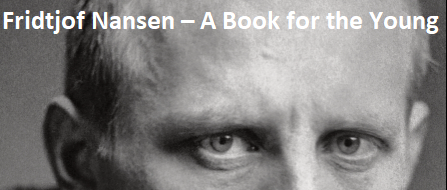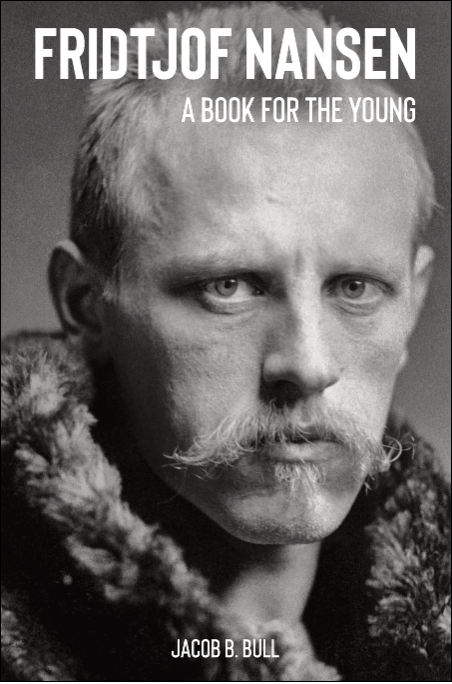Guest Post: On Fridtjof Nansen
by TBG

Fridtjof Nansen was one of the great men of the 19th and 20th Centuries and perhaps the greatest Norwegian to have lived in modern times. In 1922, he received the Nobel Peace Prize "for his leading role in the return of prisoners of war, international humanitarian work, and his role as the League of Nations' High Commissioner for Refugees".
Nansen first gained fame for his arctic expeditions, crossing the Greenland ice sheet on skis in 1888 and later leading the three year long “Fram” expedition to the North Pole in 1893. Although Nansen and his crew never reached the geographic North Pole, they came further north than any previous expedition.
To this day a polar expedition is a great feat that few would be able to accomplish, but to do so 125 years ago in Nansen's time without the aid of modern equipment is even more impressive. Nansen knew the dangers involved with such expeditions; previous arctic ventures had met with failure and death and he was well aware of this.
Imagine standing on the edge of the open, frozen wasteland. Ice, snow and biting cold as far as the eye can see. No radio communication, no rescue team; just you, your wits, and your comrades; alone against the arctic elements. For most people, these are insurmountable odds, but to Nansen, they were merely a challenge. "West coast - or death!" - he is said to have uttered upon landing on the east coast of Greenland before setting out over the ice to reach the far side of the wasteland.
In the years after returning from the polar journey, Nansen became active in the movement for Norwegian independence from the union with Sweden, embracing the nationalist-liberal currents of his day. It was a turbulent time in Europe as a whole, in no small part thanks to the spread of nationalist and separatist ideas that threatened the established order, of which Nansen was a staunch proponent.
Nansen was not only an adventurer and political agitator but also a scientist. In 1888, before setting out across Greenland, he completed a doctorate based on investigations of the central nervous system in various species of invertebrates. Behind these scientific ventures, one can glimpse the same heroic ideal that drove Nansen to the Arctic; a desire to overcome one's own weaknesses in the face of overwhelming difficulties and an impulse to conquer the unknown.
The age in which Nansen lived was marked by both scientific progress and political upheaval. It was a time when the world was changing rapidly and unrest was brewing throughout Europe, the extent of which few anticipated before it was too late. In many ways it was a time not unlike our own. New ideas and technological possibilities relentlessly broke through and tore down old institutions and traditions, often at the cost of millions of lives and the loss of traditional livelihoods.
 Nansen was a unity of contradictions; a man between two ages who stood on the edge of the old world. In the spirit of his time, Nansen travelled to the world's extremities and explored one of the last land masses that had not yet been charted and conquered by the modern world. Tragically, Western Man’s joy in the vast unknown was also its undoing. Inaccessible land areas were gradually subjected to man and science; the world became increasingly smaller, more ordinary, and exhausted. At the same time, Old Europe was busily committing suicide in the trenches of Verdun and Somme. The Faustian world, led by Europe for the past 900 years, was now moving with stormy steps towards its conclusion; and its demise. In the First World War, the technological titans of modern nation states engaged in an industrial scale of slaughter never before seen in the world.
Nansen was a unity of contradictions; a man between two ages who stood on the edge of the old world. In the spirit of his time, Nansen travelled to the world's extremities and explored one of the last land masses that had not yet been charted and conquered by the modern world. Tragically, Western Man’s joy in the vast unknown was also its undoing. Inaccessible land areas were gradually subjected to man and science; the world became increasingly smaller, more ordinary, and exhausted. At the same time, Old Europe was busily committing suicide in the trenches of Verdun and Somme. The Faustian world, led by Europe for the past 900 years, was now moving with stormy steps towards its conclusion; and its demise. In the First World War, the technological titans of modern nation states engaged in an industrial scale of slaughter never before seen in the world.
At the heart of the Faustian impulse lies the yearning towards the unknown and the boundless. The magic of the open sky and the endless sea. The desire to unlock the secrets of nature. But also, the desire to map and subjugate this. And here lies the double-edged sword. It is a tragic irony that, in the enchantment of the unknown and our desire for it, we end up destroying what we love. The same Faustian drive that leads to greatness and progress empties the world of wonder: the very thing that gave it vitality and purpose.
In the sea of suffering and chaos that was the ruins of Old Europe, Nansen found a new mission to pour his overwhelming energy into and in 1921 he was appointed as High Commissioner for Refugees. Over 30 million people were affected by famine in Russia and Ukraine as a result of drought, war, revolution, and the communist seizure of grain from farmers. The situation was dire and it is estimated that more than five million people starved to death. Nansen, as High Commissioner, led a group of several international aid organisations and saved millions from starvation in the aftermath of the Russian revolution.
The Soviet Union stripped Russian refugees of citizenship in 1922, leaving them without a passport. To solve this problem, the High Commission for Refugees created the "Nansen passport". It is for this work that Fridtjof Nansen received the Nobel Peace Prize in 1922.
Nansen also led the population exchange between Turkey and Greece in 1923, after the Greco-Turkish war. Over one million Greeks were repatriated to Greece and about half a million Turks were sent to Turkey. This population exchange was for the most part involuntary, and the Greeks in particular experienced it as a defeat. It was, however, carried out efficiently and humanely with full financial compensation for those affected. This ensured that the two nations became ethnically and culturally homogeneous, something that was seen as necessary to ensure long-term peace between them.
We see a new development in Nansen's political orientation after his experiences with the Russian civil war and communist terror. The atrocities and famine in Russia and Ukraine had made a strong impression on him and he warned against the radical communist movement in Norway.
Nansen helped to establish Fedrelandslaget (Association of the Fatherland), a nationalist-conservative organisation, with the goal of serving as a counterbalance to the revolutionary labour movement in Norway. Based on his first-hand knowledge of the red terror in the east, Nansen warned against what he referred to as "class hatred". In the last years of his life, he travelled around Norway giving speeches calling for solidarity and cooperation between the different classes united in a national community, as opposed to “class warfare” agitated by the communists. In his speech at the founding of Fedrelandslaget, he addressed this topic specifically and said that brotherly love, respect, and understanding for one and another must form the foundation for a healthy and functioning society.
Nansen's philosophy combined nationalism with international cooperation and mutual respect between nations. He emphasised that all nations in the world should preserve and cultivate their unique cultural heritage. He was a particularly vocal advocate for the rights of small nations, and believed that all nations and peoples were mutually dependent on each other, and part of a larger "world organism". If a nation disappeared or lost its character, the world as a whole would suffer and be poorer for it.
It is common to praise Nansen for his humanitarian work, but what truly gives Nansen universal and timeless appeal is his personal character and feats as an adventurer and polar explorer.
Nansen lived as an aristocrat of the soul. He was enough unto himself and had unshakeable faith in his goals. This gave him formidable power and made him a giant among men in his own lifetime. Nansen's remarkable life and achievements speak to us through history and his feats have made him a national hero in Norway. Fridtjof Nansen combines several dimensions in him; adventurer, scientist, writer, statesman and humanitarian philanthropist; which makes him the greatest Norwegian of modern times.
Therefore, it is an interesting question; would there have been room and opportunity for a man of Nansen's calibre and character in today’s modern Europe or America? And if the answer is no, it is worth asking what have we lost along the way that makes this so? This is worth reflecting on as we celebrate and remember the great feats and accomplishments of Fridtjof Nansen.
With thanks to: https://legatum-books.com/ who have recently published a book on Nansen, which can be found here: Fridtjof Nansen – A Book for the Young